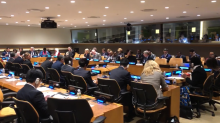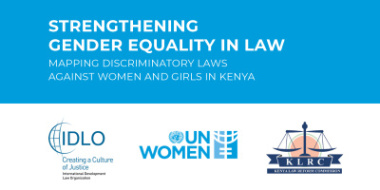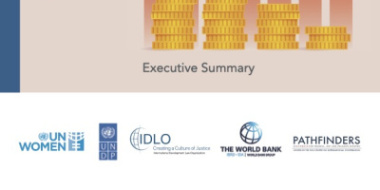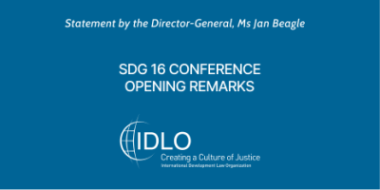2030 Agenda

IDLO and the United Nations' 2030 Agenda for Sustainable Development
Building institutions for peace and justice, strengthening accountability, empowering women and girls, fighting corruption, protecting biodiversity and promoting inclusive economic growth are just a few examples of the ways in which IDLO’s programs and other activities further the implementation of the SDGs.
The principles of the rule of law – equality, equity, inclusion, rights, laws and strong institutions – are embedded throughout the United Nations 2030 Agenda for Sustainable Development, and especially Sustainable Development Goal (SDG) 16, which aims to “promote peaceful and inclusive societies for sustainable development, provide access to justice for all and build effective, accountable and inclusive institutions at all levels”. Goal 16 is not isolated in objective, and in fact, IDLO programs have demonstrated how it drives the success of other SDGs.
IDLO’s Strategy 2020 is inspired by the vision of the 2030 Agenda and its goals of advancing access to justice, combating inequalities and promoting social inclusion. IDLO has long been a champion of the rule of law as both an outcome and enabler of sustainable development. As a strong advocate for the inclusion of Goal 16 in the 2030 Agenda, IDLO is fully committed to advancing the SDGs.
The rule of law is relevant to all three dimensions of sustainable development: economic, social and environmental. By providing stable and transparent legal regimes, the rule of law encourages economic development. By ensuring equal opportunity and equitable access to basic services, it promotes social development. By strengthening the laws to protect the environment and ensure proper management of natural resources, it ensures environmental sustainability.
IDLO continues to foster debates and dialogue at the national and international levels on Agenda 2030, focusing specifically on equality, inclusion and access to justice. IDLO’s presence in New York, Geneva, Rome and The Hague harnesses strategic international platforms such as the High-Level Political Forum in New York, the UN Human Rights Council in Geneva, and the United Nations Committee on Food Security in Rome to give a multiplier effect to its policy advocacy.
Whether in fragile contexts, emerging democracies or middle-income countries, IDLO contributes to the 2030 Agenda through its programs, research and policy advocacy, positioning the rule of law as a key ingredient for sustaining peace, fostering development and building just and inclusive societies.

The consultations on, and final form of, what has become known as the 2030 Agenda have made one thing clear: the imperatives of inclusivity, equity and justice are central to the global pursuit for sustainable development. The space for a genuine dialogue about human rights and democratic governance has opened up. View More
H.E. Inga King: The rule of law is crucial for sustainable development
"We all long for justice" UN Deputy High Commissioner for Human Rights
In turbulent times, invest in justice and peace
“There are silver threads which the international community has woven into a tapestry known as the UN 2030 Agenda for Sustainable Development,” remarked IDLO’s Director-General Irene Khan at the opening of IDLO’s 2018 Partnership Forum. “At the heart of this tapestry is access to justice and the rule of law.”

Spotlight on NCDs at the UN: The intersection of health, gender and law
“The rule of law is a crucial part of the response to non-communicable diseases (NCDs),” IDLO’s Director-General, Irene Khan, told assembled Heads of State and Government in New York on the occasion of the 73rd United Nations General Assembly. “Yet, law is not necessarily the first thing that comes to mind. That is understandable.

UNGA73 | Stand up for SDG16+
73rd Session of the United Nations General Assembly: Stand up for SDG16+
STATEMENT OF THE INTERNATIONAL DEVELOPMENT LAW ORGANIZATION
United Nations Headquarters, New York
Delivered by Irene Khan, Director-General, IDLO

Pages
Key Initiatives
-
 Until recently, court processes in the Kyrgyz Republic have not been automated. Manual or paper systems still are required and are the norm although automating all processes has started very actively. According the country’s National Target Program for Development of the Judiciary, automated information systems need to be expanded and rolled out to the whole judicial system, not only within all first instance courts, but also second and third instance courts.
Until recently, court processes in the Kyrgyz Republic have not been automated. Manual or paper systems still are required and are the norm although automating all processes has started very actively. According the country’s National Target Program for Development of the Judiciary, automated information systems need to be expanded and rolled out to the whole judicial system, not only within all first instance courts, but also second and third instance courts. -
 Non-communicable diseases (NCDs) kill 15 million people between the ages of 30 and 69, and over 86 per cent of these "premature" deaths occur in low- and middle-income countries.The economic impact, including loss of income by people harmed by NCDs, the costs of treatment, and the impacts on families threaten international development. Through regulation and fiscal reforms, countries can promote healthy diets, physical activity, and other initiatives reducing the prevalence and harms of NCDs.
Non-communicable diseases (NCDs) kill 15 million people between the ages of 30 and 69, and over 86 per cent of these "premature" deaths occur in low- and middle-income countries.The economic impact, including loss of income by people harmed by NCDs, the costs of treatment, and the impacts on families threaten international development. Through regulation and fiscal reforms, countries can promote healthy diets, physical activity, and other initiatives reducing the prevalence and harms of NCDs.
Latest Activity
|
Publication
|
|
Policy Statements
|





